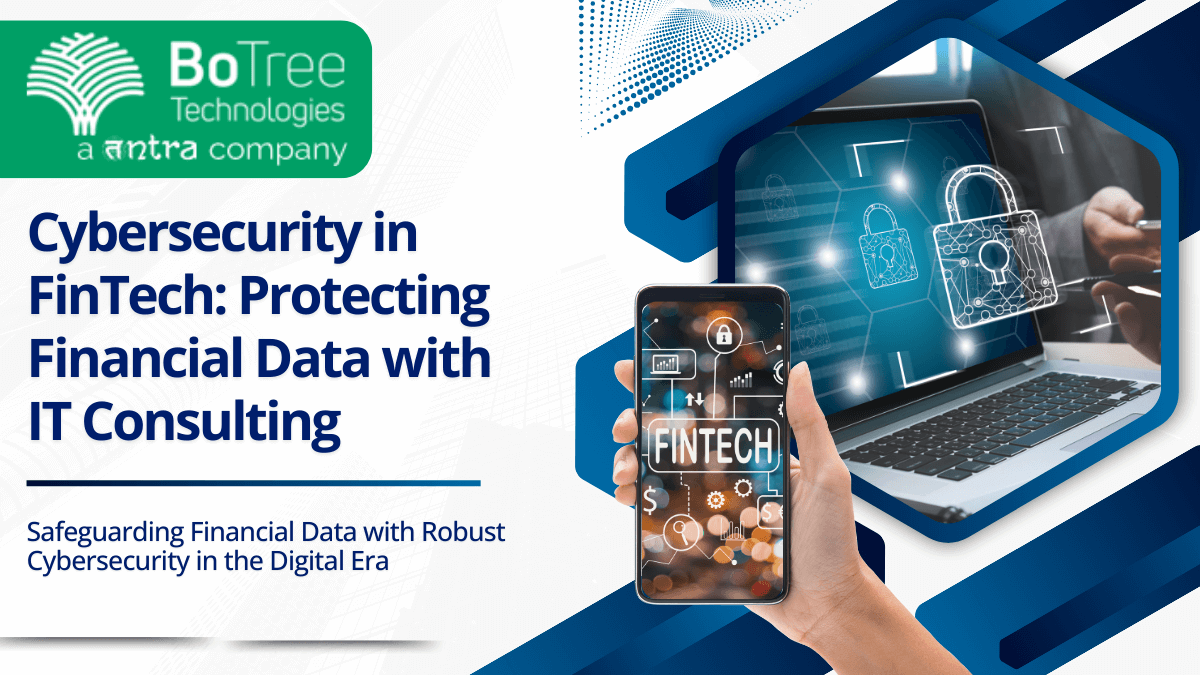
Cybersecurity in FinTech: Protecting Financial Data with IT Consulting
Cybersecurity in FinTech: Safeguarding Financial Data in a Digital Era
In the ever-evolving FinTech landscape, cyber-security is a must. This blog discusses CyberSecurity in FinTech, how FinTechs secure data, Financial data security solutions, and FinTech cybersecurity best practices. It also talks about emerging technologies such as AI-based cybersecurity for FinTech and Blockchain to ensure financial security as well as regulatory and cloud security considerations. So hire the top fintech app development companies and enterprise software development services to make sure everything is safe and sound as well as your future financial security. Continue reading to learn more.
In the world we live in today, where technology is becoming all-pervasive, the intersection of finance and technology has helped in many ways but has also led to a large vulnerability: cybersecurity. With more and more financial transactions happening in the online world, Cybersecurity in FinTech has become a great priority for businesses and consumers. From a fledgling startup to an established organization, you need to ensure that not only does your sensitive information remain protected by robust FinTech data protection, but more importantly, it is done in a way that does not lose the trust of your customer.
Understanding the Threat Landscape in FinTech
The financial sector remains a prime target for cybercriminals due to the high value of financial data. Common threats include phishing, ransomware, malware attacks, and insider risks. These threats not only compromise sensitive information but also erode customer trust.
For FinTech companies, deploying robust financial data security solutions is critical for survival. Key measures include:
- Threat detection in online banking to identify vulnerabilities early.
- Penetration testing for financial apps to uncover potential flaws before exploitation.
- Implementing layered security strategies by combining traditional methods with advanced technologies.
By addressing these challenges proactively, FinTech firms can build resilient defenses against evolving cyber risks.
FinTech Cybersecurity Best Practices
To mitigate risks effectively, FinTech companies must adopt comprehensive cybersecurity practices:
- Risk Management in FinTech: Regularly assess potential risks, evaluate their impact, and implement strategies to minimize exposure.
- Employee Training Programs: Educate staff on recognizing threats like phishing and social engineering attacks.
- Regular Audits and Updates: Conduct frequent system audits to adapt to rapidly evolving threats.
- Data Encryption in Financial Services: Secure sensitive information both at rest and during transmission.
- Multi-Factor Authentication (MFA): Enhance user access security through multiple verification steps.
These practices form the backbone of any robust FinTech security solution, ensuring both compliance and operational efficiency.
The Role of Advanced Technologies in FinTech Security
Emerging technologies are transforming how FinTech companies approach cybersecurity:
- AI-Driven Cybersecurity for FinTech: Artificial intelligence enables real-time threat detection, predictive analysis, and automated responses to potential breaches.
- Blockchain for Financial Security: Blockchain provides tamper-proof transaction records that enhance transparency and trust while improving overall data security.
- Real-Time Threat Monitoring for Banking: Continuous monitoring systems allow organizations to detect suspicious activities instantly and respond swiftly.
By leveraging these innovations, businesses can stay ahead of cybercriminals while optimizing their operations.
Secure Payment Gateways and Cloud Infrastructure
Securing payment pathways is a critical aspect of FinTech cybersecurity:
- Secure Payment Gateway Solutions: Ensure encrypted transactions to reduce the risk of breaches.
- Cloud Security in Financial Services: Protect sensitive data stored in cloud environments by implementing robust security measures.
These solutions not only safeguard financial transactions but also build consumer trust in digital platforms.
Regulatory Compliance: A Pillar of Financial Data Protection
Compliance with regulations such as GDPR, PCI DSS, and AML is essential for maintaining customer trust and avoiding penalties. By partnering with experts in software engineering solutions, FinTech firms can integrate compliance mechanisms seamlessly into their systems.
Key benefits of regulatory compliance include:
- Enhanced customer confidence through transparent practices.
- Alignment with global standards for data protection.
Developing Resilient FinTech Security Solutions
Building resilient security solutions requires a multi-faceted approach:
- Monitoring and Incident Response: Implement continuous monitoring systems to detect suspicious activities and respond swiftly.
- Consultations with Experts: Collaborate with a trusted fintech app development company or IT consulting partner for tailored solutions.
- Investing in R&D: Stay ahead of cybercriminals by investing in research and innovation through partnerships with providers of digital transformation services.
These strategies ensure that organizations remain secure while fostering growth in a competitive market.
The Future of Cybersecurity in FinTech
As technology advances, so do the methods for securing it. The future of cybersecurity will likely include:
- Quantum computing for unbreakable encryption.
- Enhanced zero-trust architectures across financial systems.
- Greater integration of AI-driven solutions for proactive threat mitigation.
By adopting these innovations, the FinTech industry can create a safer digital economy for businesses and consumers alike.
The Human Element in Cybersecurity
While technology plays a critical role in cybersecurity, the human element cannot be overlooked. Trust and transparency are essential components of any successful strategy. By educating customers about security protocols and fostering open communication, businesses can build stronger relationships with their users.
Collaborating for Success
Collaboration is key to achieving robust cybersecurity. Partnering with a reliable provider of enterprise software development services or fintech app development solutions ensures access to specialized expertise. These collaborations enable organizations to customize their security practices to meet specific challenges while staying ahead of emerging threats.
Cybersecurity in FinTech: Fostering Innovation and Sustainable Growth
In today’s digital-first world, securing financial data is more important than ever. Through proactive strategies such as risk management, penetration testing, real-time threat monitoring, and regulatory compliance, FinTech companies can protect sensitive information while maintaining customer trust. BoTree Technologies stands ready to assist in this crucial endeavor, offering tailored cybersecurity solutions designed to address the unique challenges of the FinTech landscape.
By leveraging cutting-edge technologies like AI-driven cybersecurity for FinTech and blockchain-based solutions, organizations can create a secure ecosystem that fosters innovation and growth. Partnering with trusted providers of software product engineering services further strengthens these efforts, ensuring long-term success in an increasingly interconnected world. With its expertise in fintech app development solutions and enterprise software development services, BoTree Technologies can guide your organization in building a robust and resilient security posture, safeguarding your valuable assets and ensuring a future of secure growth.
Take the first step toward securing your financial future—Contact BoTreeTechnologies today!
FAQs
What is the biggest cybersecurity threat facing FinTech companies today?
A: The FinTech industry faces numerous threats, but phishing attacks combined with ransomware are particularly pervasive. These attacks often target employees, leading to data breaches and system compromises. Implementing strong phishing and ransomware protection for finance is crucial.
How can AI improve cybersecurity in the FinTech sector?
A: AI-driven cybersecurity for FinTech enhances threat detection by identifying unusual patterns, predicting potential breaches, and automating incident responses. AI algorithms can analyze vast amounts of data in real time, providing faster and more accurate threat assessments than traditional methods.
What role does blockchain play in enhancing financial data security?
A: Blockchain for financial security provides a decentralized, tamper-proof system that improves data integrity and transparency. By enabling secure and immutable transaction records, blockchain technology helps prevent fraud and enhances trust among users.
Why is regulatory compliance so critical for FinTech companies?
A: Regulatory compliance in FinTech security ensures adherence to legal standards, protects consumer data, and enhances organizational credibility. Compliance with regulations like GDPR, PCI DSS, and AML is essential for maintaining customer trust and avoiding penalties.
How does IT consulting enhance cybersecurity for FinTech businesses?
A: How IT consulting enhances FinTech security includes providing specialized expertise, conducting regular audits, and implementing tailored security solutions. IT consultants help FinTech companies identify vulnerabilities, develop robust security strategies, and stay ahead of emerging threats.
How can FinTech companies prevent cyberattacks effectively?
A: How FinTech companies prevent cyber attacks involves implementing a multi-layered security approach, including robust firewalls, intrusion detection systems, employee training, and regular security audits. Staying informed about the latest threats and vulnerabilities is also crucial.




